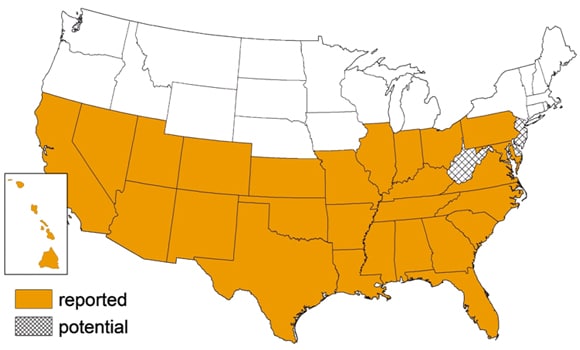The Centers for Disease Control and Prevention has issued an alert about this particular bug, and you need to regard the warning. You or your children’s lives may depend on it.
While the bug looks seemingly harmless, authorities are saying that it could kill you by introducing a Trypanosoma cruzi parasite into your body, effectively producing Changas disease. In case you don’t know about the disease, it’s one “which has infected as many as 8 million people worldwide,” says WHIO News.
As far as physical symptoms are concerned, the disease “has an acute phase much like the flu to start. Then it transitions into a chronic phase, during which up to 30 percent of people develop heart problems and 10 percent develop gastrointestinal issues.”
Known as the triatomine bug — or less informally the “kissing bug” — according to 11-ALIVE News, the insect has been reported all across the southern regions of the United States. Below, you can see all the states that have reported the bug’s presence.
As previously reported by Mad World News, for the most part, the insect tend to suck blood from whatever host on which it lands. WHIO News mentions that they’re called “kissing bugs” because they’re known to bite people’s faces at night during sleep. The possibly fatal issue is what happens after they finish feeding on your blood.
As if the parasite wasn’t enough, this bug tends to defecate after each feeding. People are more in danger when the bug leaves its “crap” on the host, and the host unknowingly rubs it or scratches it into the bitten area — as well as bringing the infectious material to other entryways of the body, like the eyes and mouth.
Deadly ‘kissing bug’ spreads to other states besides Texas https://t.co/MHyUG7d766pic.twitter.com/BhFRdojdtH
— My Statesman (@MyStatesman) November 24, 2015
It’s important to keep vigilant where this bug is concerned. According to the source, it’s best to look for the insect via the following areas:
- beneath porches
- Between rocky structures
- Under cement
- In rock, wood, brush piles, or beneath bark
- In rodent nests or animal burrows
- In outdoor dog houses or kennels
- In chicken coops or houses
Specifically, the CDC states the following about “kissing bugs,” says NBC-12 News:
“Please do not touch or squash the bug. Place a container on top of the bug, slide the bug inside, and fill it with rubbing alcohol or, if not available, freeze the bug in the container.”
This threat must surely be legitimate, if the CDC is willing to forewarn the public to such an extent. Life is much too short to live it carelessly, disregarding authoritative warnings like this.
This particular bug isn’t to be confused with another popular, similar-looking bug that comes around every few years — the love bug. Although the love bug is also referred to as a kissing bug, it isn’t deadly.
Love bugs attached to each other, not to be confused with “Kissing Bugs.”
So, with that in mind, it would behoove you to steer clear of the aforementioned infectious insects, since they’ve been reported in so many states. It seems likely that you’ll probably see one sooner or later.
Also, just to be on the safe side so you’re not confused about the correct identity, I would even avoid love bugs. While children tend to be curious about most-all bugs, these deadly “kissing bugs” aren’t worth the possibly fatal curiosity.
Original article and credits: madworldnews.com

